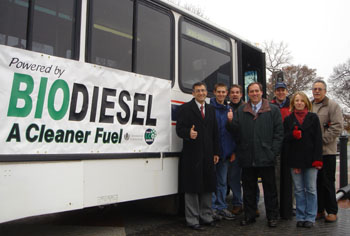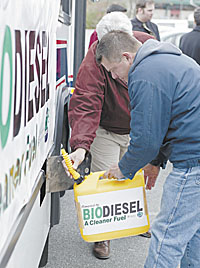The University of Connecticut has demonstrated support for renewable fuels by running its shuttle buses with a biodiesel blend. This biodiesel is produced on-campus from waste cooking oil donated by campus-run dining locations. As these goals progress, the University will be continuing its initiatives to support and promote biofuels and the overall reduction in greenhouse gases.
 During the 2006 Spring Weekend concert, Gus Kellogg of Greenleaf Biofuels, LLC took up the opportunity to truck-in his Biodezl brand name biodiesel fuel to fill up the bus of Guster, the opening act for O.A.R. The band’s tour bus runs on a B20 blend of biodiesel. The blend produced by Greenleaf Biofuels, LLC is a biodiesel made from vegetable oils such as soy bean, mustard seed, rapeseed (canola) and sunflower seed.
During the 2006 Spring Weekend concert, Gus Kellogg of Greenleaf Biofuels, LLC took up the opportunity to truck-in his Biodezl brand name biodiesel fuel to fill up the bus of Guster, the opening act for O.A.R. The band’s tour bus runs on a B20 blend of biodiesel. The blend produced by Greenleaf Biofuels, LLC is a biodiesel made from vegetable oils such as soy bean, mustard seed, rapeseed (canola) and sunflower seed.
The University of Connecticut Biodiesel Consortium was formed in 2006 to advance the study and promote the production of biodiesel and other important biofuel sources here on campus. Currently, the University produces 3,000-4,000 gallons of waste cooking oil a year. Consequently, the University is now collecting and converting some of this oil to produce about 100 gallons of biodiesel every month. All UConn shuttle buses run on a B5 (5% biodiesel) or lower blend, thanks to a pilot-scale biodiesel production facility put into operation in August of 2006.
 Using the biodiesel produced by the team, on November 12, 2006, a B-20 blend – 20% pure biodiesel mixed with 80% petroleum diesel – powered one of the University’s shuttle buses, and carried University President Philip E. Austin and other members of the University’s Building and Grounds Committee from North Hillside Road to the Depot Campus. The bus was later parked outside the Student Union as part of a display to educate passersby about the team’s research efforts as well as the potential future role of biodiesel at the University. To emphasize the role of waste cooking oil in the production process and celebrate the team’s success, French toast sticks and other refreshments were donated by Dining Services.
Using the biodiesel produced by the team, on November 12, 2006, a B-20 blend – 20% pure biodiesel mixed with 80% petroleum diesel – powered one of the University’s shuttle buses, and carried University President Philip E. Austin and other members of the University’s Building and Grounds Committee from North Hillside Road to the Depot Campus. The bus was later parked outside the Student Union as part of a display to educate passersby about the team’s research efforts as well as the potential future role of biodiesel at the University. To emphasize the role of waste cooking oil in the production process and celebrate the team’s success, French toast sticks and other refreshments were donated by Dining Services.
On November 28, 2006, the Office of Environmental Policy held an “Earth Kindness Day” in conjunction with the annual Month of Kindness season at the University of Connecticut. One highlight from this event was a display from the OEP and Biofuels Consortium about the “Biodiesel Bus”, an informational event educating students, faculty, and visitors about UConn’s involvement with biodiesel. In addition to providing informational literature and tactile interaction, the two Red line buses drove the entire day running on a B15 (15% biodiesel) blend to demonstrate the ease of using biodiesel in diesel engines without any modification.
As the research continues, students and faculty here at UConn are exploring options to expand existing biodiesel research and development efforts to produce enough biodiesel to keep our fleet running consistently on a B-20 blend.
Related News
- Seaweed may be grown commercially in Connecticut waters west of New Haven (New Haven Register, 8/23/12)
- Richard Parnas, Chair of UConn Biofuel Consortium awarded 2007 ELA Award (2007 Environmental Leadership Awards)
- Out of the Frying Pan, into the Gas Tank (Uconn Advance, 11/29/2004)